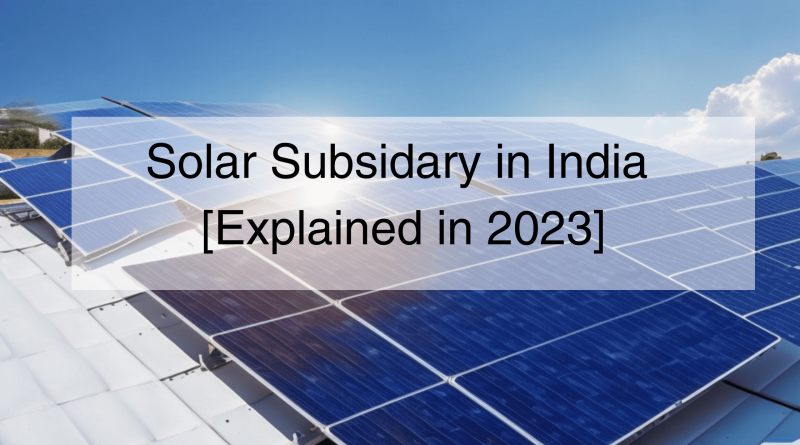Solar Subsidary in India [Explained in 2024]
India has made great strides in promoting renewable energy, particularly solar energy, to meet its growing energy needs and reduce carbon emissions. As part of its commitment to sustainable development, the Indian government offers solar subsidies to incentivize residential and commercial entities to use solar energy systems. In this blog, we’ll explain the solar subsidy program in India for 2023 and walk you through the steps to claim the subsidy. Take this opportunity and join the solar revolution today!
Table of Contents
What is a solar subsidy?
Solar subsidies are the government’s financial support to encourage the adoption of solar energy systems. These subsidies are intended to offset the initial capital cost of installing solar panels and make solar energy more accessible and affordable to individuals and businesses.
Solar Subsidy Programme in India (2023)
The Solar Subsidy Program in India for 2023 continues the government’s commitment to promoting renewable energy. The program offers various incentives to eligible individuals, including subsidies for installing solar panels, related equipment, and government-backed loans at reduced interest rates.
Eligibility Requirements for the Solar Incentive
To qualify for solar incentives, specific eligibility criteria must be met. These criteria include the type of property (residential or commercial), location, solar system performance, and compliance with relevant government or state agency standards and regulations.
Steps to qualify for the Solar Subsidy
a. Selecting an Accredited Solar Company: Select a reputable and accredited solar company that can assist you with the system’s design, financing, and Installation. Look for companies that have experience applying for incentives.
b. Site Assessment and Feasibility Study: the solar company will assess the solar potential of your site, taking into account factors such as roof orientation, shading, and available space. A feasibility study will determine the optimal system size and potential energy production.
c. Submitting the grant application: The solar company will help you prepare and submit the application with all necessary documentation and information, including system specifications, cost estimates, and feasibility studies.
d. Solar Power System Installation: Once your grant application is approved, the solar company will begin installing your solar power system. It will ensure that the system complies with the relevant standards and regulations.
e. Inspection and Documentation: After Installation, the solar power system will be inspected by the government authorities or their designated agencies. The solar company will help you prepare the required documentation and submit the applications for the subsidy.
Benefits of the Solar Subsidy
Energy independence: using solar power reduces dependence on the power grid and protects you from rising electricity costs.
Solar energy is a clean energy source that lowers carbon emissions and helps create a more environmentally friendly future.
Reduces carbon emissions and contributes to the development of an ecologically responsible future.
Final thoughts
The solar incentive programme in India for the year 2023 is an excellent opportunity for individuals and businesses to go solar and contribute to a more sustainable future. By following the steps above and working with Solarclue, you can take advantage of the incentive and reap the benefits of solar energy for yourself. Contact us today to start your solar energy journey and do your part in India’s clean energy revolution.
Are you ready to go solar and take advantage of the subsidies? Contact for expert advice on applying for subsidies, hassle-free installations, and high-quality solar power systems tailored to your needs.
With solar power. Take the first step towards a brighter and more sustainable future!




